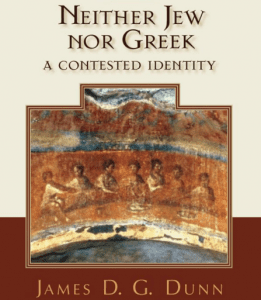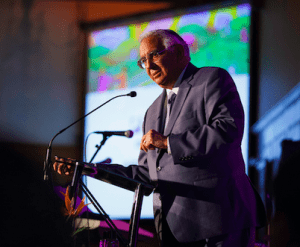Suppose theology started here: “Thomas said to him, ‘My Lord and my God!’” (John 20:28). John’s Gospel offers this: crucifixion wounds + resurrection wonder = glory. A thoroughly Jewish man, Thomas, is confessing to the resurrected man, Jesus of Nazareth, acclamations of adoration and surrender reserved only for Israel’s one true God, Yahweh. The context is Thomas’s touching Jesus’ crucifixion wounds. While the awe of resurrection stuns Thomas, the death marks of the cross are visibly and inescapably evident. Thomas crumbles in worship before the man, Christ Jesus, while blurting out names of the undeniable, Old Testament deity. Thomas makes it very personal with the double “my” (see Greek text). Thomas is either correct with his words or, as a dyed-in-the-wool-Jew, he’s blatantly blaspheming.
I think the Apostle John wants to redefine the definition of glory. Glory (Hebrew kabod meaning weighty, influential, glory) does not lose any of its Old Testament overwhelming impact (to humans) in John’s Gospel, but it does gain the attribute of selfless passion and pain. I often thought that when John wrote “we have seen his glory” (John 1:14), he was referring to his eyewitness experience of the transfiguration of Jesus. But that event is not recorded in John’s Gospel. That concept has to be imported. Glory in John’s Gospel is tied to “the hour” that is to come for Jesus. Jesus prays, “Father, the time (hour) has come. Glorify your Son, that your Son may glorify you” (John 17:1). The hour of the glory of Jesus is the event of the crucifixion of Jesus (A. J. Kostenberger, Baker Exegetical Commentary on the New Testament: John, 95).
Glory may work two ways: 1. Glory (God’s weightiness) can squash us. God’s glory is extremely powerful in creating a response. God’s glorious power can smack us to our knees. Think Isaiah 6 and Acts 9 (Saul of Tarsus). 2. Glory can stun us into humble, adoring wonder. “Love so amazing, so divine, demands my soul, my life, my all.” I think God desires to express glory through love rather than through power. Yet, God reserves the right to use glory as needed.
The one man Thomas worshiping the resurrected Jesus of Nazareth offers us a glimpse of the impact of God’s salvation through “the lamb that was slain” on the nations of the earth. All the nations in the presence of self-giving love declare God’s glory and power. The apocalypse of John gives us a peek into the future (Revelation 7:9-12). Thomas represents the pivot of a doubtful humanity before the Christ, the Son of God. We observe a very human response to the sharpest point in salvation history: the death and resurrection of Jesus the Messiah, Savior of the world. As N.T. Wright is fond of asking, “Is God Jesus?” Perhaps theology is not working from deity to humanity, but just the reverse: thinking through real humanity (Jesus of ‘can-anything-good-come-out-of-Nazareth’) to stunning deity (“my Lord and my God!”) within the grand Story of the God of Israel.
Power can create compliance. Rarely does it provoke love. Most of the “glory” of humanity is the love of power. The glory of God is the power of love. Massive weapons do not cause all humanity to bow to Jesus; scars from deep wounds do. “Glory to God in the highest!”












